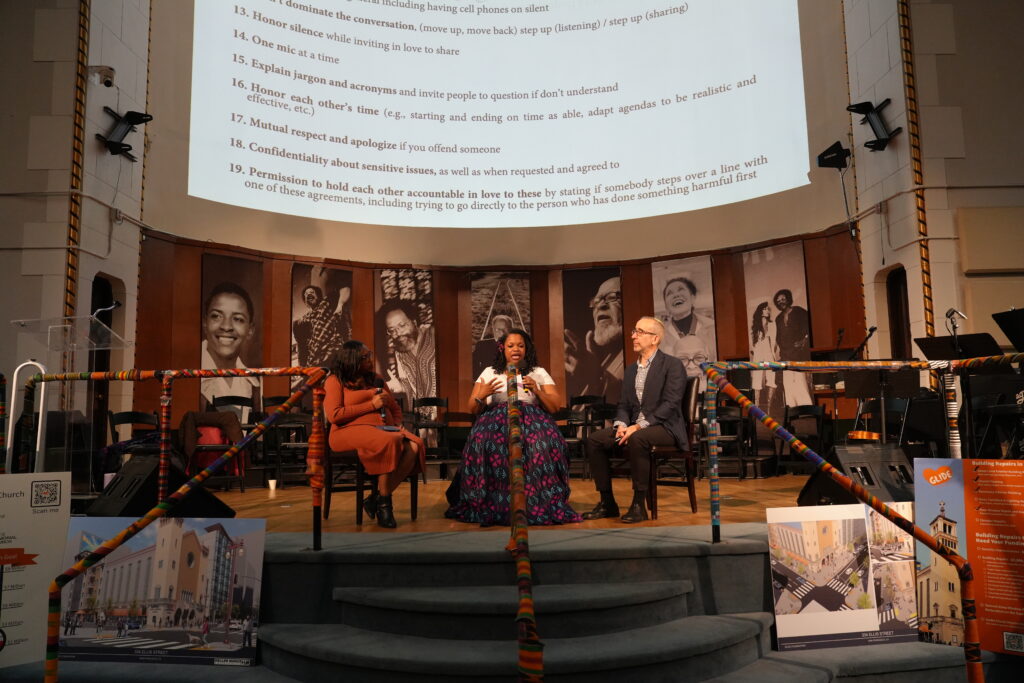
On January 30th, we gathered inside Glide Memorial Church’s sanctuary for Justice in Selma, Justice in the Tenderloin: An Invitation to Personal and Communal Introspection. The conversation brought together Ainka Jackson, Executive Director of the Selma Center for Nonviolence; Rabbi Michael Lezak, our Center for Social Justice Director; and Dr. Leanna Lewis from UCSF. We opened the evening the GLIDE way, with music and praise led by Regina Wells, our Senior Manager of Training and Development. It set the stage for real conversation.
Justice isn’t just about remembering history, it’s about acting today. At GLIDE, love demands justice, and that means standing up for racial and economic equity. Be part of the work. Show up, get involved, and push for change. Read more in our blog post, GLIDE’s Juneteenth: Honoring Freedom and Advancing Justice.
Ainka introduced herself and the Selma Center for Nonviolence, an organization continuing the unfinished work of the Civil Rights Movement. She shared the Shared Love Agreements, guidelines that set the tone for honest and respectful dialogue. These agreements remind us that understanding doesn’t always come first, but compassion should. With that foundation, we moved into a deeper conversation about justice, economic struggle, and the work happening in Selma and the Tenderloin.
For more on the historical and present-day fight for justice in Alabama, check out our blog post on the Alabama Pilgrimage: Pursuing Progress.
Ainka explained that her organization is focused on changing harmful laws and addressing the deeper cycles that keep modern-day Selma struggling. While the city holds a significant place in civil rights history, economic disinvestment and systemic barriers continue to impact its residents today. She emphasized that policy reform alone isn’t enough, real change happens when people have access to jobs, education, and resources that allow them to build stable lives.
Through the Selma Center for Nonviolence work, her team is creating pathways for economic growth and community healing, ensuring that Selma’s legacy isn’t just remembered but actively sustained. Like Selma, the Tenderloin faces ongoing challenges rooted in systemic injustice, making long-term investment in people essential to real change.
In 2015, Selma was one of the most impoverished cities in the country and had one of the highest murder rates. Despite its place in civil rights history, years of economic disinvestment left many residents without opportunities. Ainka emphasized that addressing crime and poverty takes more than policing, it requires long-term investment in people’s futures. Without opportunities, the same cycles repeat.
That’s where Selma 2.0 comes in. It’s a call to action that connects Selma’s history to real solutions. The initiative is helping build a stronger, more sustainable community through job programs, economic development, and nonviolent intervention. Ainka pointed out that while Selma attracts visitors from all over the world to walk across Edmund Pettus Bridge, most leave without engaging with the people who live there. Her organization is working to change that by creating attractions and opportunities that encourage people to stay, support local businesses, and be part of Selma’s future, not just its past.
Selma and the Tenderloin may be on opposite sides of the country but share many of the same struggles. Both communities have been shaped by systemic injustice, economic hardship, and cycles of violence. Both are places where resilience is not just a word but a daily act of survival and hope. Just like Selma 2.0 is working to rebuild Selma from within, we at GLIDE are committed to ensuring the Tenderloin’s people have access to what they need, whether it’s meals, housing, health services, or advocacy.
This month at GLIDE, our theme is “Love Calls for Justice for Black Americans.” Justice is love in action, and that love must extend beyond remembrance and into real change. That means advocating for policies that lift communities, supporting organizations that do the work, and ensuring justice isn’t just an idea but something we live out daily.
This isn’t just a conversation; it’s a call to action. If we want to see real justice, we have to stay engaged. Please support the work of the Selma Center for Nonviolence by visiting their website at www.selmacenterfornonviolence.org. Get involved with GLIDE’s efforts in Tenderloin and beyond. Please find a way to step into the movement because justice isn’t something we wait for. It’s something we build together.
